Dr. Strangelove or: How I Learned to Stop Worrying and Love the Bomb Blu-ray Movie
HomeDr. Strangelove or: How I Learned to Stop Worrying and Love the Bomb Blu-ray Movie 
45th Anniversary Special EditionSony Pictures | 1964 | 95 min | Rated PG | Jun 16, 2009
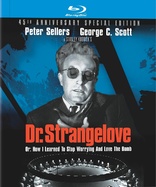
Movie rating
8.6 | / 10 |
Blu-ray rating
| Users | 4.4 | |
| Reviewer | 4.5 | |
| Overall | 4.4 |
Overview
Dr. Strangelove or: How I Learned to Stop Worrying and Love the Bomb (1964)
After a psychotic Air Force general unleashes an ingenious, foolproof and irrevocable scheme sending bombers to attack the Soviet Union, the U.S. President phones the Soviet premier in a desperate effort to save the world.
Starring: Peter Sellers, George C. Scott, Sterling Hayden, Keenan Wynn, Slim PickensDirector: Stanley Kubrick
| Drama | 100% |
| Dark humor | 27% |
| War | 22% |
| Imaginary | 10% |
Specifications
Video
Video codec: MPEG-4 AVC
Video resolution: 1080p
Aspect ratio: 1.66:1
Original aspect ratio: 1.66:1
Audio
English: Dolby TrueHD 5.1 (48kHz, 24-bit)
English: Dolby Digital Mono (192 kbps)
French: Dolby TrueHD 5.1
Subtitles
English, English SDH, French, Arabic, Dutch
Discs
50GB Blu-ray Disc
Single disc (1 BD)
Bonus View (PiP)
BD-Live
Playback
Region free
Review
Rating summary
| Movie | 5.0 | |
| Video | 4.0 | |
| Audio | 4.0 | |
| Extras | 4.0 | |
| Overall | 4.5 |
Dr. Strangelove or: How I Learned to Stop Worrying and Love the Bomb Blu-ray Movie Review
Kubrick's hilarious 1964 masterwork finally arrives on Blu-ray...
Reviewed by Kenneth Brown June 9, 2009Every time I have the chance to revisit a film from the late Stanley Kubrick's fascinating canon, I find myself wondering what the monolithic director would think of the 21st century had he lived to see it. Would his brow furrow at the realization that man and machine are developing the same precarious bond as Dave and Hal shared in 2001: A Space Odyssey? Would realistic depictions of modern conflict like Generation Kill remind him of his biting exploration of the minds of men under fire in Full Metal Jacket? Would he bristle at society's attempts to medicate every flaw out of its citizenry as if every individual was strapped in a chair alongside A Clockwork Orange's Alex, eyes transfixed on a flashing screen that promises to bring them relief from their most depraved thoughts? More to the point, would the mounting threat of nuclear annihilation -- a threat that seemed to subside for a time at the end of the Cold War -- strike the prophetic filmmaker as comically inevitable and ridiculously insane as it did when he decided (late in pre-production) to transform Dr. Strangelove or: How I Learned to Stop Worrying and Love the Bomb into a dark and scathing satirical comedy?
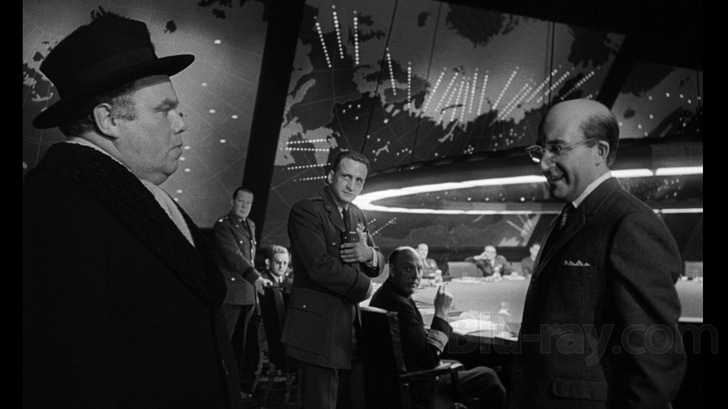
"But this is absolute madness, Ambassador! Why should you build such a thing?"
Loosely (I stress loosely) adapted from British author Peter George's bleak 1958 thriller, Red Alert, Dr. Strangelove is an unrelenting, mad-hatter romp through a geopolitically-charged conflict that brings America and Russia to the brink of mutual assured destruction. When a delusional Brigadier General (Sterling Hayden) orders a B-52 squadron to attack Russia, he locks himself in a room with his second-in-command, Captain Lionel Mandrake (Peter Sellers), and refuses to recall the bombers. At the Pentagon, a gruff Air Force General named Buck Turgidson (George C. Scott) briefs the President (Sellers in a second role) on the situation, insisting that the best way to deal with the rogue commander is to support his advance on the Russkies. Instead, the President warns the Soviet Premier of the looming danger and allows Russian Ambassador Alexi de Sadesky (Peter Bull) to join their heated war room discussion. But when the Ambassador reveals the existence of a secret Doomsday countermeasure his country recently installed (a weapon designed to automatically annihilate all life on the planet in the event of a nuclear attack), tensions run high, Turgidson panics, and the President turns to an unlikely advisor: a former-Nazi strategist named Dr. Strangelove (Sellers yet again). Jarring hilarity ensues as the American and Russian leaders attempt to concoct a solution to the crisis before it's too late.
Kubrick wields irony, absurdist comedy, and political satire more effectively than Dr. Strangelove's Cold War superpowers wield their own armaments: each character is so blind to the reality of their circumstances, so unequivocally selfish in their every thought and reaction that the film's one seemingly pulled punch -- an opening title card that states the Air Force has safeguards in place to prevent any such occurrence, and that none of the characters are meant to represent actual people -- is actually an all-too-knowing wink to the audience that everything they're about to see is more accurate than anyone would like to admit or believe. No matter how simple the gag ("Gentlemen! You can't fight in here... this is the War Room!"), Kubrick uses it to launch a volley of barbed arrows at a variety of targets, drawing more blood in a single scene than most acclaimed satires draw in two hours. His vision is pointed and intense; his thoughts and intentions all too clear. Name another film that tackles the futility of large-scale confrontations, the disquieting mindsets of those poised overtop the proverbial button, and the unexpected hilarity that ensues when the powers-that-be attempt to establish some semblance of order in the midst of chaos. Name another director who could deliver frighteningly plausible military logic from the mouth of a trembling, wheelchair-bound Nazi. Name another classic that's as simultaneously disturbing, amusing, telling, daring, and rewarding as Kubrick's engrossing black comedy. Having trouble? Don't worry... so did I.
Of course, Kubrick's striking vision of a superpowers-gone-awry isn't the only thing responsible for making Dr. Strangelove such a memorable film. Sellers' performance trifecta is both a staggering achievement and a joyous sight to behold: his American president is woefully inept, his Royal Air Force captain is mercilessly befuddled, and his eccentric German mad scientist -- one of the most ingenious sources of mirth and exposition to have ever graced the silver screen -- is deliciously unsettling. Regardless of his persona, Sellers is in complete control of his mannerisms and expressions, relying on subtle cues as much as exaggerated physical comedy to render each character a force unto themselves. The actor vanishes into thin air, leaving only a trio of doomed, power-hungry false prophets on the verge of extinction. And let's not forget George C. Scott. He not only inadvertently lays the groundwork for a Patton performance that will come some six years after Dr. Strangelove, he matches Sellers' commitment and abandon with commendable vigor. His Kubrickian general is a paranoid, overworked lout who can't separate himself from his narrow-minded training. He vaults across the war room like a teeth-grinding junkie hopped up on all manner of narcotics; his investment in every line as remarkable as his grandiose gestures and froth-mouthed distaste for his enemies. Together, Sellers and Scott are unstoppable, ingesting every encounter and exchange as if their careers depended on it.
Still, despite their phenomenal performances, it's Dr. Strangelove's shocking relevance and resonance -- even in our so-called "enlightened" 21st century -- that makes it such a timeless classic. Political scientists and budding politicians would do well to study Kubrick's messages and store them in their minds. The film is a cinematic masterpiece to be sure, but it's far more than that. A troubling work of art, a series of veiled prophecies, a sharp-witted comedy, a nerve-racking thriller, an experiment in the absurd... Dr. Strangelove is all these things and more. If you've never taken the opportunity to partake from the director's finest goblet, don't miss this chance to do so. If you've returned to drink more often than you care to recount, be sure to add this to your collection post haste. Simply put, it's one of the greatest comedies, and arguably one of the greatest films, of all time.
Dr. Strangelove or: How I Learned to Stop Worrying and Love the Bomb Blu-ray Movie, Video Quality 
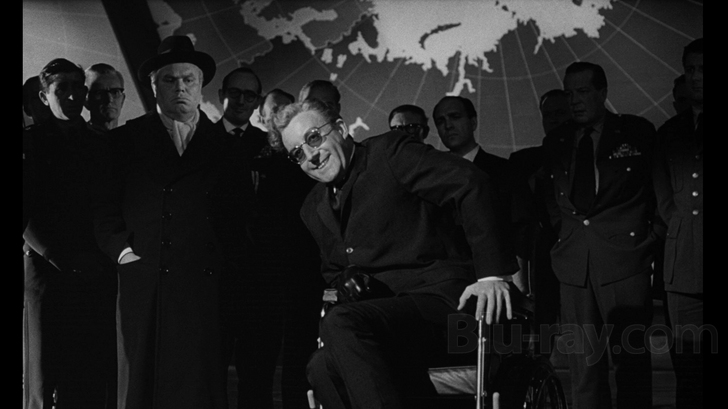
Much to my relief, Sony's 4K restoration pays proper homage to Kubrick's intentions with a faithful 1080p/AVC-encoded transfer that renders each scene with meticulous care and revitalizes the director's forty-five-year old production. A filmic veneer of heavy grain peppers every frame, giving Dr. Strangelove a wonderful cinematic texture befitting its era. Clarity is rarely affected and, more often than not, reveals far more detail than those who own the film on DVD are accustomed to seeing. Behold the grooves of the nervous doctor's leathery glove, the tiny dials framing James Earl Jones' smooth flight helmet, the cross-hatched stitching of several stuffy suits, and the pinpoints of light dotting the war room's global monitoring stations. More importantly, contrast is spot on: midrange gradients are clean, whites are crisp, blacks are inky, and delineation is both natural and absorbing. Edge enhancement spoils the integrity of the image a bit, but aside from a few glaring halos, it's hardly a distraction.
If I have any lingering complaint, it's that errant artifacts and print damage make their presence known (particularly during the various B-52 flight and in-flight sequences). Even though they don't ruin the overall presentation, they're intrusive enough to warrant some concern. Thankfully, banding, noise reduction, telecine wobble, and contrast wavering are nowhere to be found. The Blu-ray edition of Dr. Strangelove may not feature the most spectacular catalog transfer on the market, but videophiles and Kubrick enthusiasts alike should be more than pleased with the results.
Dr. Strangelove or: How I Learned to Stop Worrying and Love the Bomb Blu-ray Movie, Audio Quality 
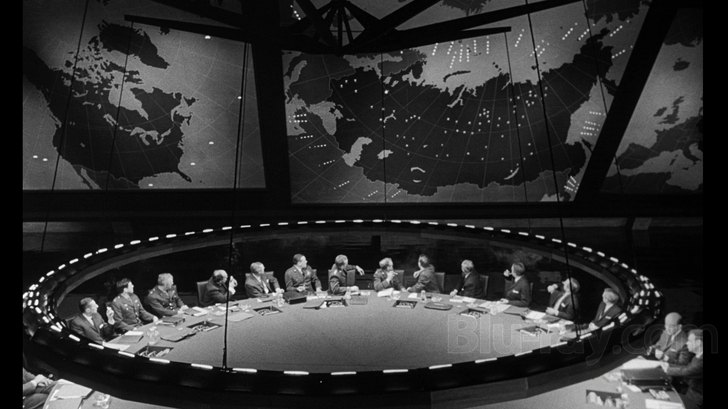
Sony serves up two audio options: a retooled Dolby TrueHD 5.1 surround remix for modern filmfans, and a high-quality presentation of the film's original mono track for purists. Both mixes deliver their respective goods in subtle style. The dynamic remix stands out with subdued (but effective) rear speaker activity and a welcome dose of low-frequency support, while the crystal clear mono track is surprisingly spry considering it's been minted from a forty-five-year old source. Likewise, the TrueHD offering spreads its wares across the soundfield, thereby creating more convincing war room experiences and engaging B-52 visits, while the mono mix relies on precise prioritization to avoid unfortunate pile-ups in the soundscape. Of course, the condition of the original audio elements lead to a few mishaps (air hiss and inconsistent dialogue normalization among them), but any shortcomings are fairly negligible. Ultimately, regardless of your preference, the Blu-ray edition of Dr. Strangelove should satiate your hunger for steady, reliable sonics. I can't imagine Kubrick's chatty black comedy sounding any better than it does on each of these excellent tracks.
Dr. Strangelove or: How I Learned to Stop Worrying and Love the Bomb Blu-ray Movie, Special Features and Extras 
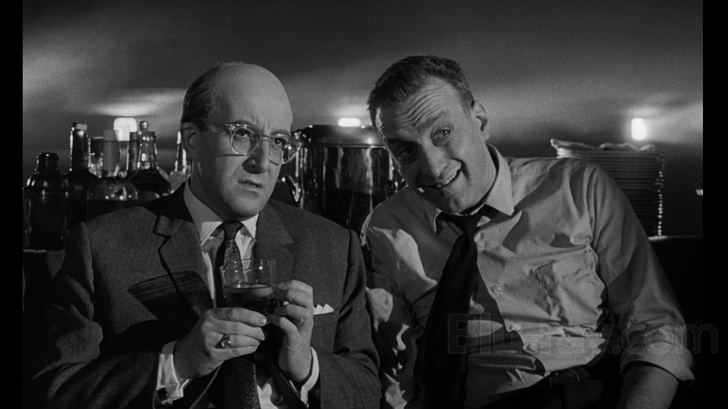
Collectors and completists rejoice! Sony's attractive 32-page Digibook release of Dr. Strangelove boasts a strong collection of supplemental materials befitting a classic film of its stature. Better still, it includes all of the significant special features that appear on the 2001 SE DVD and the 2004 40th Anniversary Edition DVD, and even tacks on an exclusive Picture-in-Picture Trivia Track for good measure.
- The Cold War: One of the fullest, most informative, and most satisfying Picture-in-Picture trivia tracks I've had the pleasure to sit through, Sony's exclusive gem bombards the viewer with endless facts, offers extensive production notes, and packs in a surprising number of video-based interview segments with former US military commanders, Air Force personnel, military experts and advisors, and historians. The track rarely lets up; I encountered some slight pauses as clips loaded, but the overall quality and quantity of the content was quite staggering. If you're familiar with Dr. Strangelove, be sure to take the time to sit through this fascinating PiP experience.
- Inside Dr. Strangelove (SD, 46 minutes): Despite its chummy narration, this engrossing documentary deftly digs into the production, Kubrick's last-minute decision to transform his film into a satirical comedy, the actors' improvisational talents, and the many hats of Peter Sellers.
- No Fighting in the War Room (SD, 30 minutes): An engaging, recently-produced documentary that passes the microphone to several notable filmmakers, critics, experts, and historians to dissect Dr. Strangelove, its themes, characters, dialogue, satire, and enduring legacy.
- An Interview with Robert McNamara (SD, 25 minutes): The former Secretary of Defense (himself the subject of director Errol Morris' brilliant documentary, Fog of War) discusses nuclear proliferation, the reality of nuclear threats, the Cold War, modern crises of conscience, strategic defense, and much more.
- Best Sellers (SD, 19 minutes): This Peter Sellers-centric featurette covers the legendary actor's life and career, the three roles he plays in Kubrick's masterpiece, and his contributions to each character.
- The Art of Stanley Kubrick (SD, 14 minutes): While it isn't as meaty as I had hoped, this From Short Films to Strangelove featurette is an all-too-brief catch-all that focuses on the evolution, development, and eventual direction of the film.
- Split-Screen Interviews (SD, 7 minutes): Archive interviews with Peter Sellers and George C. Scott that suffer from poor context. They're decent, but ultimately frivolous.
- BD-Live Functionality
Dr. Strangelove or: How I Learned to Stop Worrying and Love the Bomb Blu-ray Movie, Overall Score and Recommendation 
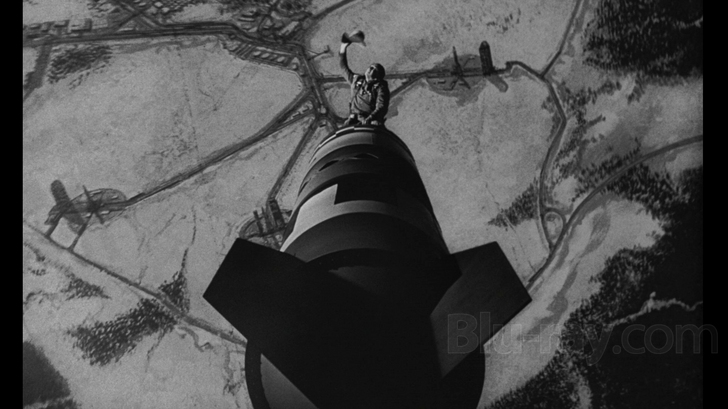
There are only two excuses for breezing past Dr. Strangelove: ignorance or bad taste. If you fall into the former camp, let me assure you that Kubrick's 1964 satirical comedy is sharper, edgier, and funnier than 99% of the junk being dumped in theaters today. If you fall into the latter... well, I suppose some people are just beyond salvation. Luckily, both fans and newcomers will find that Sony has given the film an outstanding Digibook release that features an excellent video transfer, a pair of strong audio tracks, and a healthy collection of supplements (including a fantastic PiP experience exclusive to this Blu-ray edition). My advice? Stop wasting time mulling about the bottom of my review and make your way to Amazon as soon as humanly possible. Trust me, you won't regret the purchase.
Other editions
Dr. Strangelove or: How I Learned to Stop Worrying and Love the Bomb: Other Editions

Dr. Strangelove or: How I Learned to Stop Worrying and Love the Bomb
1964

Dr. Strangelove or: How I Learned to Stop Worrying and Love the Bomb
1964

Dr. Strangelove or: How I Learned to Stop Worrying and Love the Bomb 4K
1964
Similar titles
Similar titles you might also like

Fail Safe
1964

Paths of Glory
1957

5 Days of War
2011

The Great Dictator
1940

Generation Kill
2008

Lions for Lambs
2007

Breaker Morant
1980

The Thin Red Line
1998

Apocalypse Now 4K
Final Cut | 40th Anniversary Edition
1979

The Day After
1983

Full Metal Jacket 4K
1987

The Green Berets
1968

The Deer Hunter
1978

Che: Part Two
2008

Punishment Park
1971

Coriolanus
2011

Cross of Iron
1977

The Big Parade
Warner Archive Collection
1925

Jarhead
2005

M*A*S*H
1970